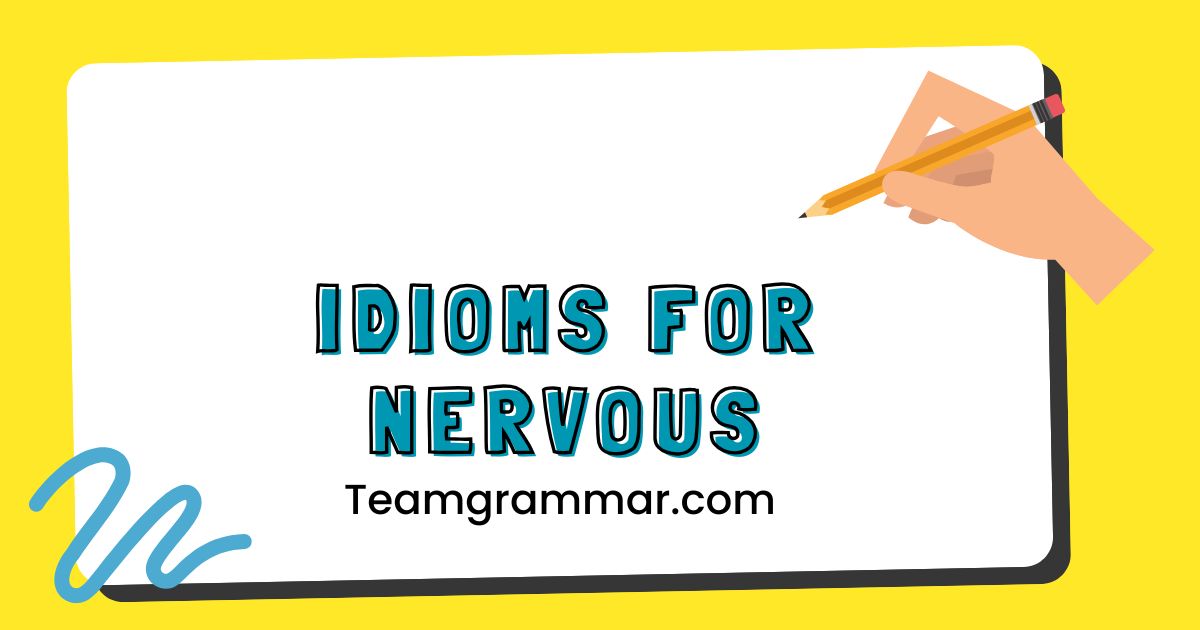39 Idioms for Nervous: Mastering Expressive English
Understanding idioms is crucial for mastering the nuances of the English language. Idioms add color and depth to our communication, allowing us to express complex emotions and ideas in a concise and relatable way.
Specifically, learning idioms related to the feeling of nervousness can significantly enhance your ability to articulate your feelings and understand others’ anxieties. This article is designed for English language learners of all levels, from beginners to advanced speakers, who wish to expand their vocabulary and improve their fluency by mastering idioms that convey nervousness.
Table of Contents
- Introduction
- Definition of Idioms for Nervous
- Structural Breakdown of Idioms
- Types and Categories of Nervousness Idioms
- Examples of Idioms for Nervous
- Usage Rules for Idioms
- Common Mistakes When Using Nervousness Idioms
- Practice Exercises
- Advanced Topics
- Frequently Asked Questions
- Conclusion
Definition of Idioms for Nervous
An idiom is a phrase or expression whose meaning cannot be understood from the literal meanings of its individual words. Instead, it has a figurative meaning that is known through common usage.
Idioms related to nervousness are phrases used to describe feelings of anxiety, apprehension, or unease. These idioms often paint a vivid picture of the physical and emotional sensations associated with being nervous.
Understanding these idioms allows for a more nuanced and expressive communication of these feelings.
Idioms function as a type of figurative language, enriching the way we express emotions. They are classified as fixed expressions, meaning their word order and structure are generally unchangeable.
These idioms often appear in everyday conversations, literature, and various forms of media, making their comprehension essential for effective communication. The context in which an idiom is used is crucial for understanding its intended meaning, as the literal interpretation would often be nonsensical.
Classification of Idioms
Idioms can be classified based on their structure and the imagery they evoke. Some common classifications include:
- Metaphorical Idioms: These use metaphors to convey meaning, such as “butterflies in my stomach.”
- Similes: These use “like” or “as” to make a comparison, though similes directly related to nervousness are less common as standalone idioms.
- Hyperbolic Idioms: These use exaggeration to emphasize a point, such as “scared to death.”
Function of Nervousness Idioms
Nervousness idioms serve several key functions in communication:
- Expressing Emotion: They provide a colorful and relatable way to describe feelings of anxiety.
- Adding Emphasis: Idioms can intensify the feeling being expressed.
- Connecting with Others: Using common idioms can make your communication more relatable and understandable.
Contexts of Idiom Usage
Idioms for nervousness are used in a variety of contexts, including:
- Personal Conversations: Describing your own feelings or understanding someone else’s.
- Literature: Adding depth and emotional resonance to characters and narratives.
- Media: In movies, TV shows, and news reports to convey the emotional state of individuals.
Structural Breakdown of Idioms
Idioms, although seemingly simple, have a specific structure that contributes to their meaning. Understanding this structure can help in recognizing and using idioms correctly.
Most idioms related to nervousness follow a pattern of using concrete imagery to represent abstract feelings. For instance, the idiom “butterflies in my stomach” uses the image of fluttering butterflies to represent the sensation of anxiety.
The structure of an idiom is generally fixed. Changing the words or their order can alter or completely destroy the idiom’s meaning.
For example, saying “butterflies in my belly” instead of “butterflies in my stomach” would sound unnatural and may not be understood. This rigidity is a key characteristic of idioms.
Common Idiom Patterns
Several patterns are common in idioms related to nervousness:
- Body Part Imagery: Many idioms use body parts to represent the physical sensations of nervousness, such as “cold feet” or “heart in your mouth.”
- Animal Imagery: Some idioms use animals to symbolize fear or anxiety, such as “like a deer in headlights.”
- Exaggeration: Some use hyperbole to emphasize the intensity of the feeling, such as “scared stiff.”
Grammatical Structure
Idioms can take various grammatical forms. They can be:
- Phrases: Such as “a bundle of nerves.”
- Clauses: Such as “my heart was in my mouth.”
- Sentences: Such as “I had butterflies in my stomach.”
Types and Categories of Nervousness Idioms
Idioms that express nervousness can be categorized based on the intensity of the feeling they convey, the imagery they use, and the specific situations that trigger the nervousness. Understanding these categories helps learners choose the most appropriate idiom for a given context.
Intensity-Based Categories
This categorization reflects the level of anxiety being expressed:
- Mild Nervousness: Idioms expressing slight unease or anticipation, such as “antsy.”
- Moderate Nervousness: Idioms indicating a noticeable level of anxiety, such as “butterflies in my stomach.”
- Severe Nervousness: Idioms expressing intense fear or panic, such as “scared out of my wits.”
Imagery-Based Categories
This categorization focuses on the type of imagery used in the idiom:
- Physical Sensation: Idioms describing physical symptoms of nervousness, such as “cold sweat.”
- Animalistic: Idioms using animal behavior to convey fear, such as “like a deer in headlights.”
- Figurative Transformation: Idioms suggesting a temporary change in state due to fear, such as “scared stiff.”
Situation-Based Categories
This categorization is based on the context or situation causing the nervousness:
- Performance Anxiety: Idioms related to nervousness before a performance, such as “stage fright.”
- Anticipation: Idioms related to nervousness while waiting for something, such as “on pins and needles.”
- General Anxiety: Idioms related to general feelings of unease, such as “on edge.”
Examples of Idioms for Nervous
The following tables provide a comprehensive list of idioms related to nervousness, categorized by their intensity and usage. Each table includes examples of the idiom used in a sentence to provide context and clarity.
Table 1: Idioms for Mild Nervousness
This table showcases idioms used to describe a slight feeling of unease or anticipation.
| Idiom | Meaning | Example Sentence |
|---|---|---|
| Antsy | Restless and impatient. | I get antsy when I have to wait in long lines. |
| Have the jitters | To be nervous or uneasy. | She had the jitters before her presentation. |
| On edge | Tense and irritable. | He’s been on edge all day waiting for the news. |
| A little nervous | Slightly anxious. | I’m a little nervous about the interview. |
| Uneasy | Slightly worried or uncomfortable. | She felt uneasy about leaving her child with the new babysitter. |
| Apprehensive | Anxious or fearful that something bad or unpleasant will happen. | He was apprehensive about the upcoming surgery. |
| On tenterhooks | In a state of suspense or agitation because of uncertainty about something. | We were on tenterhooks waiting for the exam results. |
| Butterflies | A fluttering sensation in the stomach, usually due to nervousness. | I always get butterflies before a big performance. |
| On pins and needles | In a state of nervous anticipation. | We were on pins and needles waiting for the doctor to call. |
| Anxious | Experiencing worry, unease, or nervousness. | She felt anxious about her final exams. |
| Tense | Stretched tight or strained; also, nervous or uneasy. | The atmosphere in the room was tense as everyone waited. |
| Restless | Unable to relax or be still, typically due to anxiety or boredom. | He became restless during the long meeting. |
| Wary | Feeling or showing caution about possible dangers or problems. | She was wary of trusting people she didn’t know well. |
| In a sweat | To be very nervous or anxious about something. | He was in a sweat about missing his flight. |
| On alert | Being fully aware and prepared for something that might happen. | The security team was on alert after the threat. |
| Fidgety | Inclined to fidget, typically as a result of nervousness or impatience. | The children were fidgety during the long sermon. |
| In suspense | A state or feeling of excited or anxious uncertainty about what may happen. | The audience was in suspense as the magician revealed his trick. |
| Unsettled | Feeling or causing anxiety or unease. | The news left him feeling unsettled for days. |
| Edgy | Nervous and irritable. | She was feeling edgy after drinking too much coffee. |
| Concerned | Worried, troubled, or anxious. | He was concerned about his mother’s health. |
| On edge of seat | Very excited, nervous, or eager for something to happen. | We were on the edge of our seats during the thrilling game. |
| In a state | To be very nervous or upset. | She was in a state after losing her keys. |
| Preoccupied | Engrossed in thought and distracted due to worry or anxiety. | He seemed preoccupied with the upcoming deadline. |
| Aflutter | In a state of tremulous excitement. | Her heart was aflutter with anticipation. |
Table 2: Idioms for Moderate Nervousness
This table includes idioms that describe a noticeable level of anxiety or discomfort.
| Idiom | Meaning | Example Sentence |
|---|---|---|
| Butterflies in my stomach | Feeling nervous, usually before a performance or event. | I always get butterflies in my stomach before giving a speech. |
| Heart pounding | The sensation of your heart beating rapidly due to nervousness. | My heart was pounding as I waited for the results. |
| Sweaty palms | Having moist hands due to anxiety. | He had sweaty palms when he met his idol. |
| A bundle of nerves | Extremely nervous or anxious. | She was a bundle of nerves on her wedding day. |
| Shaking in my boots | Trembling with fear or nervousness. | I was shaking in my boots when I had to present to the CEO. |
| Cold feet | Losing courage or becoming nervous before an important event. | He almost got cold feet before proposing to her. |
| In a cold sweat | Sweating due to anxiety or fear. | He woke up in a cold sweat after having a nightmare. |
| My heart was in my mouth | Feeling extreme fear or anxiety. | My heart was in my mouth when the car skidded on the ice. |
| On tenterhooks | Being in a state of suspense or agitation. | We were all on tenterhooks waiting for the announcement. |
| Like a cat on a hot tin roof | Very nervous or restless. | He was like a cat on a hot tin roof waiting for the phone to ring. |
| Panicky | Feeling or showing sudden, uncontrollable fear or anxiety. | She felt panicky when she realized she was lost. |
| Flustered | Agitated or confused. | He became flustered when he couldn’t find his keys. |
| Distraught | Deeply upset and agitated. | She was distraught after hearing the bad news. |
| Agitated | Feeling or appearing troubled or nervous. | He became agitated when the meeting ran late. |
| Unnerved | Having lost courage or confidence; disconcerted. | She was unnerved by the strange noise in the house. |
| Frantic | Wild or distraught with fear, anxiety, or other emotion. | They were frantic when they couldn’t find their child. |
| In a flap | In a state of great excitement or anxiety. | She was in a flap trying to get everything ready for the party. |
| Worked up | Excited, agitated, or angry. | He got worked up about the unfair decision. |
| In a stew | In a state of anxiety or agitation. | She was in a stew about the upcoming deadline. |
| Torn up | Emotionally distressed or upset. | He was torn up after the breakup. |
| On edge | Nervous and irritable. | She’s been on edge waiting for the results. |
| In a sweat | Very nervous or anxious. | He was in a sweat about missing his flight. |
| Frazzled | Completely exhausted and overwhelmed. | She felt frazzled after a long day at work. |
| Spooked | Frightened or startled. | The loud noise spooked the cat. |
Table 3: Idioms for Severe Nervousness
This table presents idioms that describe intense fear or panic.
| Idiom | Meaning | Example Sentence |
|---|---|---|
| Scared out of my wits | Extremely frightened. | The sudden noise scared me out of my wits. |
| Scared stiff | So frightened that one is unable to move. | I was scared stiff when I saw the snake. |
| Petrified | Extremely scared; terrified. | She was petrified of public speaking. |
| Frozen with fear | Unable to move due to intense fear. | He was frozen with fear when he saw the bear. |
| Like a deer in headlights | So frightened or surprised that one is unable to move or think. | She stood there like a deer in headlights when the accident happened. |
| Jumping out of my skin | To be extremely startled or frightened. | The loud bang made me jump out of my skin. |
| My blood ran cold | To be very frightened. | My blood ran cold when I heard the scream. |
| Nearly jumped out of my skin | To be extremely frightened or startled. | I nearly jumped out of my skin when the door slammed shut. |
| Terrified | Extremely frightened. | She was terrified of heights. |
| Horrified | Extremely shocked and frightened. | We were horrified by the news report. |
| Paralyzed with fear | Unable to move due to intense fear. | He was paralyzed with fear during the robbery. |
| White as a ghost | Looking very pale due to fear or shock. | She turned white as a ghost when she heard the news. |
| Lost my nerve | To lose courage or confidence. | He lost his nerve before the important match. |
| Freaked out | To become very anxious, agitated, or alarmed. | She freaked out when she saw the spider. |
| In a panic | Experiencing sudden uncontrollable fear or anxiety. | He was in a panic when he couldn’t find his passport. |
| At my wits’ end | Having exhausted all means of dealing with a problem; at the limit of one’s mental resources. | I’m at my wits’ end trying to solve this puzzle. |
| Beside myself | Overwhelmed with worry, grief, or anger. | She was beside herself with worry when her son didn’t come home. |
| Out of my mind | Extremely worried or anxious. | I was out of my mind with worry when I couldn’t reach her. |
| In a blue funk | In a state of depression or anxiety. | He’s been in a blue funk since he lost his job. |
| Scared to death | Extremely frightened. | I was scared to death when I heard the footsteps outside. |
| Frightened out of my wits | Extremely frightened. | The horror movie frightened me out of my wits. |
| About to have a nervous breakdown | On the verge of experiencing a mental health crisis due to stress or anxiety. | She felt like she was about to have a nervous breakdown because of the pressure at work. |
| Going to pieces | Becoming emotionally or mentally unstable due to stress or trauma. | After the accident, he felt like he was going to pieces. |
| Coming apart at the seams | Becoming unable to cope with stress or pressure. | She was coming apart at the seams trying to manage everything. |
Usage Rules for Idioms
Using idioms correctly involves understanding their specific meaning and context. It’s important to remember that idioms are not meant to be taken literally and that their meaning is derived from cultural usage.
Here are some key rules to follow when using idioms related to nervousness:
Context is Key
Always consider the context in which you are using the idiom. The situation, the relationship between the speakers, and the overall tone of the conversation can all affect how an idiom is interpreted.
For example, using “scared out of my wits” in a casual conversation about a minor inconvenience might sound exaggerated or inappropriate.
Know Your Audience
Be mindful of your audience’s familiarity with idioms. While idioms are common in everyday conversation, they may not be well-understood by non-native speakers or people from different cultural backgrounds.
In such cases, it’s better to use more direct and literal language.
Avoid Overuse
While idioms can add color to your language, overuse can make your speech sound unnatural or contrived. Use idioms sparingly and only when they genuinely enhance your message.
Maintain Structure
Idioms have a fixed structure, and altering this structure can change or negate their meaning. Avoid changing the words or their order.
For example, instead of saying “butterflies in my belly,” stick to the correct form: “butterflies in my stomach.”
Appropriateness
Consider the formality of the situation. Some idioms may be too informal for professional or academic settings.
Choose idioms that are appropriate for the context.
Common Mistakes When Using Nervousness Idioms
Even advanced English learners can make mistakes when using idioms. Here are some common errors to watch out for:
Literal Interpretation
The most common mistake is interpreting idioms literally. For example, someone might think “cold feet” actually means having cold feet, rather than being nervous about something.
Always remember that idioms have a figurative meaning.
Incorrect: I couldn’t go skiing because I had cold feet.
Correct: He got cold feet and decided not to propose.
Incorrect Word Choice
Using the wrong words in an idiom is another common mistake. For example, saying “butterflies in my belly” instead of “butterflies in my stomach.”
Incorrect: I have butterflies in my belly before the test.
Correct: I have butterflies in my stomach before the test.
Misunderstanding Meaning
Assuming an idiom means something it doesn’t is another frequent error. For example, thinking “on pins and needles” means being uncomfortable physically, rather than being in a state of nervous anticipation.
Incorrect: I was on pins and needles because the chair was uncomfortable.
Correct: I was on pins and needles waiting for the doctor to call.
Using in the Wrong Context
Using an idiom in an inappropriate context can also lead to misunderstandings. For example, using “scared out of my wits” to describe mild surprise.
Incorrect: I was scared out of my wits when I saw the surprise party.
Correct: I was pleasantly surprised when I saw the surprise party.
Practice Exercises
Test your understanding of idioms for nervousness with the following exercises. Choose the correct idiom to complete each sentence.
Exercise 1: Fill in the Blanks
Choose the correct idiom from the list to complete each sentence.
Idiom List: butterflies in my stomach, a bundle of nerves, cold feet, heart in my mouth, scared out of my wits
| Question | Answer |
|---|---|
| 1. I always get __________ before giving a presentation. | butterflies in my stomach |
| 2. She was __________ on her wedding day. | a bundle of nerves |
| 3. He almost got __________ and didn’t go through with the skydiving. | cold feet |
| 4. My __________ when the car skidded on the ice. | heart in my mouth |
| 5. The sudden noise __________ . | scared me out of my wits |
| 6. Before the big game, the team was __________. | a bundle of nerves |
| 7. Seeing the spider __________ . | scared me out of my wits |
| 8. As she walked on stage, she had __________. | butterflies in my stomach |
| 9. He almost got __________ before proposing to her. | cold feet |
| 10. When I saw the snake, my __________ . | heart was in my mouth |
Exercise 2: Multiple Choice
Choose the best idiom to replace the underlined phrase in each sentence.
| Question | Answer |
|---|---|
| 1. He was very nervous about the upcoming exam. a) on edge b) a bundle of nerves c) cool as a cucumber |
b) a bundle of nerves |
| 2. She became very frightened when she heard the strange noise. a) on pins and needles b) scared out of her wits c) cool as a cucumber |
b) scared out of her wits |
| 3. I felt anxious while waiting for the results. a) on pins and needles b) in a cold sweat c) fit as a fiddle |
a) on pins and needles |
| 4. He was losing courage before the big presentation. a) getting cold feet b) having a blast c) feeling blue |
a) getting cold feet |
| 5. My heart was pounding when I saw the accident. a) heart in my mouth b) butterflies in my stomach c) cool as a cucumber |
a) heart in my mouth |
| 6. She was very tense before the interview. a) cool as a cucumber b) a bundle of nerves c) on cloud nine |
b) a bundle of nerves |
| 7. He got very frightened by the horror movie. a) scared out of his wits b) in the pink c) under the weather |
a) scared out of his wits |
| 8. I get nervous before every performance. a) butterflies in my stomach b) cold feet c) on cloud nine |
a) butterflies in my stomach |
| 9. She felt very anxious about the surgery. a) cool as a cucumber b) on pins and needles c) in the pink |
b) on pins and needles |
| 10. He was very nervous waiting for the phone to ring. a) like a cat on a hot tin roof b) in the pink c) under the weather |
a) like a cat on a hot tin roof |
Advanced Topics
For advanced learners, understanding the cultural and historical context of idioms can further enhance their comprehension and usage. Many idioms have roots in historical events, literature, or cultural practices.
Exploring these origins can provide deeper insights into the nuances of the English language.
Additionally, advanced learners can focus on recognizing and using idioms in different dialects of English. Idioms can vary significantly between American English, British English, and other regional variations.
Mastering these differences can improve communication with a wider range of English speakers.
Dialectal Variations
Some idioms are more common in certain dialects. For example, an idiom used frequently in British English might be less common or even unknown in American English.
Being aware of these differences can prevent misunderstandings and improve cross-cultural communication.
Historical Context
Understanding the historical origins of idioms can provide deeper insights into their meanings. For example, the idiom “cold feet” is believed to have originated from the idea that fear causes the blood to rush away from the extremities, making the feet feel cold.
Knowing this origin can enhance one’s appreciation for the idiom’s imagery.
Frequently Asked Questions
- What is an idiom?
An idiom is a phrase or expression whose meaning is different from the literal meaning of the individual words. It’s a figurative expression that is understood through common usage.
- Why is it important to learn idioms?
Learning idioms enhances your understanding of the English language, improves your fluency, and allows you to communicate more effectively and expressively. Idioms add color and depth to your language.
- How can I learn idioms effectively?
The best way to learn idioms is through exposure and practice. Read widely, listen to native speakers, and try to use idioms in your own conversations. Pay attention to the context in which idioms are used.
- Are idioms the same in all English-speaking countries?
No, idioms can vary significantly between different English-speaking countries and regions. Be aware of these variations to avoid misunderstandings.
- Can I create my own idioms?
While you can be creative with language, idioms are generally fixed expressions that are understood through common usage. Creating your own idioms may not be effective, as they may not be understood by others.
- How do I know when to use an idiom?
Consider the context, your audience, and the formality of the situation. Use idioms when they enhance your message and are appropriate for the situation.
- What should I do if I don’t understand an idiom?
Ask for clarification. Don’t be afraid to ask someone to explain the meaning of an idiom if you don’t understand it.
- Is it okay to use idioms in formal writing?
Generally, it’s best to avoid idioms in formal writing, as they can be seen as too informal. Stick to more direct and literal language in academic or professional contexts. However, some idioms are acceptable if they are commonly used and well-understood.
- How can I avoid making mistakes when using idioms?
Practice using idioms in different contexts, and pay attention to how native speakers use them. Avoid literal interpretations, and be mindful of the fixed structure of idioms.
- Where can I find more resources for learning idioms?
There are many online resources, dictionaries, and textbooks that can help you learn idioms. Look for resources that provide examples and explanations of idiom usage.
Conclusion
Mastering idioms related to nervousness is a valuable step towards achieving fluency and expressiveness in English. By understanding the definitions, structures, and usage rules of these idioms, learners can enhance their ability to communicate their feelings and understand others’ anxieties more effectively.
Remember to practice using idioms in various contexts and be mindful of your audience to avoid misunderstandings.
Continue to expand your vocabulary by exploring different types of idioms and paying attention to how native speakers use them. With consistent effort and practice, you can confidently incorporate idioms into your everyday conversations and writing, adding color and depth to your language skills.
Embrace the challenge and enjoy the journey of mastering the nuances of the English language.







